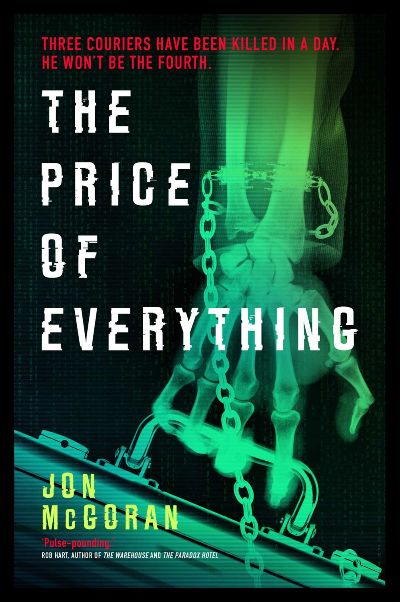There’s no horror here but plenty of scares as nine-year-old Effie must parent her siblings in her family’s freezing shack in the western New Zealand bush. With the nearest town, Koraha, six hours walk through dense forest, Mum with a new baby and Dad mostly off hunting and fishing, it’s all Effie can do to keep the little ones fed and warm. The new baby, the fourth child and named four, heralds a much harder chapter for the family, one that ultimately sees Effie living as an adult in Scotland. She’s compelled to return to New Zealand when reports reach her that a little girl—unknown to Effie but looking exactly like her—has shown up in the town, injured and starving. Who she is and what happened in the past is a twist-filled saga that drops readers right into the dangerous landscapes that are both the New Zealand wilderness (“an unforgiving thing that would eat them up”) and the off-off grid family. One to remember, and a must for fans of Barbara Kingsolver’s Poisonwood Bible and Alisa Alering’s Smothermoss.
Book of the Week
In this Korean bestseller, police detective Suyeon is called to the scene of the fourth suicide of an elderly patient at a crumbling hospital in a deserted part of Incheon. Her boss believes the deaths, spurred perhaps by pervasive depression and loneliness, are coincidental and sees no point in investigating further, especially since their families had abandoned the dead. But Suyeon thinks something is off. All four victims, who suffered from dementia, jumped from the hospital’s sixth floor, but very little blood was found at the spots where they landed. Returning to the hospital later that evening, Suyeon encounters a mysterious Korean-French woman named Violette, who tells her, “A vampire did it.” A skeptical Suyeon angrily dismisses Violette until the autopsy of a fifth suicide reveals two puncture holes in the victim’s neck and the body drained of blood. Claiming to be a vampire hunter, Violette explains to Suyeon that someone at the hospital is helping a vampire target his next victims. As Suyeon seeks to identify that particular nurse, the narrative shifts back to 1983 France, when a teenage Violette, adopted by loving French parents but feeling isolated and lonely because of her Koreanness, begins a strange, intense, almost Sapphic friendship with the enigmatic, barefooted Lily. Skillfully translated (but a glossary of Korean terms would have been helpful), Cheon’s novel is more than a queer paranormal mystery (the inconsistent vampire elements are its weakest parts); instead, it’s an eerie and bleak portrait of societal loneliness, isolation, and marginalization.
Charlie Chaplin and Albert Einstein met in real life. Here that short interaction is included—the author has done his research, big time—but as part of a fictional steadfast friendship between the two that’s filled with loving banter and crime solving. The series debuts in 1937 as the scientist and actor are older, well-known figures. Chaplin is considering a movie that will lampoon Hitler (his real film The Great Dictator) and Einstein is teaching at Caltech and following with dread and guilt the development of a devastating weapon, the atom bomb, enabled by his work. When Nazis visit LA as part of a propaganda effort and all signs point to looming danger, the friends team up with Georgia Ann Robinson, the first Black female detective in LAPD history (also a real person), to thwart the plans. Antisemitism and racism are given lurid front seats here, with both shown as grotesque blights on our world. Readers will readily see parallels with white-nationalism today, making this a timely and ire-provoking read. They will also learn a great deal about Chaplin (less about Einstein, though he’s still well fleshed out), with his ladies-man ways on full display along with his kindness and sharp wit. This series promises to mix fun capers with serious societal commentary and is one to watch out for.
In Ward’s clever and unusual debut, the reader is put to work solving a murder, their task propelled by a sassy narrator who insults them throughout. The tale opens with murder-mystery dinner at which guests hear the story of a nanny who’s murdered in a case of mistaken identity; when the former man of the house, Lord Verreman, discovers that he hasn’t killed his wife, Lady Verreman is able to escape. At least, that’s what police believe. At the dinner, guests are told of various anomalies at the scene and alibis and motives for others connected to the case, and are led through the inquest after the nanny’s autopsy. Then the viewpoint switches: a detective is hired by the rich couple’s son and is required to visit the the home where the murder happened, hear the evidence—in a most unusual delivery—and reveal the culprit. These first two sections are unusual enough, but the third tops them: the reader is presented with all the evidence and must make choices step by step as to what they believe, in the end reaching a verdict of their own (a contract is in place, after all). What an intriguing start for this author!
I possess real expertise in only a few areas. Just two, in fact. One is crime fiction, and the other is public libraries and what makes them work. So naturally I was pretty elated to come across The Librarians, and I’m happy to report that Sherry Thomas portrays libraries and librarians as accurately as I have ever come across in a book. Set in a modest branch library in the suburbs of Austin, Texas, the novel dwells on four quirky staff members, each of whom has found both a sense of purpose and a home in the library, as well as strong friendships. But after the library’s new game night, two library users are found dead. And remarkably, these deaths trigger stories from each of the librarians, with each one finding their lives turned upside down. Thomas is a much-lauded author of historical romance, and this book shares in the eloquent writing she is known for. Perfect for a book-group discussion.
Between 1830 and 1850, the U.S. government’s forced displacement known as the Trail of Tears removed thousands of Native Americans from their ancestral lands in the Southeastern United States. But according to Native folklore, some Indigenous people evaded the Removal, sheltered by supernatural Little People. Faust’s atmospheric debut focuses on a family descended from those survivors and the generational trauma they have endured. When six-year-old Laurel Taylor vanishes from her Wisconsin home early one morning in 1996, her devastated mother, Ayita, believes her abusive ex-husband Barron kidnapped their daughter, even though Barron had abandoned the family before Ayita realized she was pregnant. But as weeks pass by and Laurel remains missing, Nadine, her older sister, begins experiencing nightmares and hearing whispers, especially in the tree house where Laurel always played. Have the Little People taken Lauren or are other family ghosts responsible? To find answers, Nadine travels with her Aunt Rosebud to South Carolina, where her fractured family has deep roots. Faust, an enrolled member of the Edisto Natchez-Kusso Tribe of South Carolina, draws on his family history and Indigenous mythology to weave a haunting tale of loss and redemption that may remind some readers of Keith Donohue’s The Stolen Child with a touch of Poltergeist.
Gwen Underfoot is a senior in high school, and her closest friends are all in college, including twins Donna and Donavan; Allie; Colin; and the young man Gwen has feelings for, Arthur, who works at the college library. An act of kindness ends up with him being blackmailed to ensure his mom stays alive: forced to steal first-edition books from the collection, Arthur wants a way out before he gets caught. The others devise a solution involving an ancient ritual and a journal bound by human skin that conjures up the dragon King Sorrow. The beast promises to help Arthur with his problem, but he and the others are now bound to the dragon, who will demand a sacrifice from each of them every year for the rest of their lives. Hill has crafted a brilliant story with well-rounded characters readers will love and hate, a terrifying spin on everyone’s worst fears, and a tale of six people bound together by a bad decision as they journey through life with that weight on their shoulders. There is even a blink-and-you-miss-it spin on the Greg Stillson campaign from Hill’s father, Stephen King’s, classic The Dead Zone. Don’t let the size of this book sway you from reading it. Joe Hill has another classic on his hands.
Normally as I read a book for review, I mentally formulate the review. (Actually, at this point, even if I’m not reading for a review I do that.) But this time I couldn’t do this because this book shook me out of normal reading mode in the best way. It’s just extraordinary, combining elements that would seem to repel one another—historical fiction about the Reconstruction era, the supernatural, and a Western—but that form the most memorable story I’ve read in some time, with writing to match. The enigmatic main character here is Ovid Vesper, a cowboy who wanders the west from job to job, with his nomadic ways creating an episodic feel to the saga. He brings with him strange powers that started after he was injured at Antietam—a Civil War battle during which he believes he died and came back. He can see otherworldly beings now, and snatches of future events. At one long stop, he’s deputized by the sheriff of Lennox, Kansas, a war comrade, and mostly deals with small-town crimes but also with bandit gangs that terrorize the area. Topping them all though is the Craither, a huge, terrifying evil that appears when he needs it least, creating havoc in an era that needs none. Adding a touch of the normal is Ovid’s quaint romance with Nancy Mavornen and his helping a neighbor whose decisions make a shocking ending to this wild, wonderful story.
We start this complicated plot with a clever ongoing fraud scheme in which a woman assumes the same name as another with a common name and a trust fund in order to steal the money. In Minneapolis, Sarah Jones has become part of a project of a Catholic highschooler doing penance for bad behavior, bringing together a bunch of women with this same name for regular coffee and conversation, making it ripe for this fraud. To avoid confusion, each member is identified by age rather than name. Thirty is our heroine; twenty-seven the thief. Added into the mix is a freshly minted FBI agent with his own secret agenda (not nefarious) and a cloistered nun with an unexpected background. A Sarah Jones, not part of the group, is found murdered, taking the fraud investigation to a new level. We have time spent in the woods, old crimes to solve, family connections, and a spot of romance. Confused? Don’t be. The story maintains its integrity and is enjoyable to the end with an interesting set of characters poised for what could be another book in the future.
In a future world where the delivery of goods is overseen by an organization called the Guild, a courier steps into a conspiracy. Armand Pierce’s job required him to have surgery to graft a titanium handcuff onto his wrist bone so that theft of an attaché case linked at the other end is physically impossible. Like the Domino’s Pizza guarantee of 30 minutes or less, the Guild promises a successful transaction or death for the courier if that person fails to deliver the package for any reason. When Pierce arrives with a package, he’s shocked to learn that the materials inside have vanished, and he’s forced to kill everyone in the room to stay alive. On the run, he has nowhere to go and nobody to trust. This ultraviolent and nonstop action sci-fi thriller delivers (no pun intended) all the goods. McGoran does a terrific job of worldbuilding, and readers will dig this blending of Blade Runner and John Wick. Is there a sequel coming?










